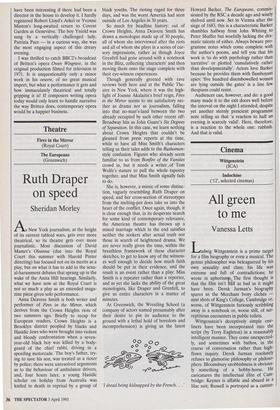Theatre
Fires in the Mirror (Royal Court) The Europeans (Greenwich)
Ruth Draper on speed
Sheridan Morley
ANew York journalism, at the height of its current tabloid wars, gets ever more theatrical, so its theatre gets ever more journalistic. Most discussion of David Mamet's Oleanna (due into the Royal Court this summer with Harold Pinter directing) has focused not on its merits as a play, but on what it has to add to the sexu- al-harassment debates that sprang up in the wake of the Anita Hill hearings. Similarly, what we have now at the Royal Court is not so much a play as an extended maga- zine piece given solo performance.
Anna Deavere Smith is both writer and performer of Fires in the Mirror, which derives from the Crown Heights riots of two summers ago. Briefly to recap for European readers, Crown Heights is a Brooklyn district peopled by blacks and Hasidic Jews who were brought into violent and bloody confrontation when a seven- year-old black boy was killed by a body- guard of the chief rabbi, driving in a speeding motorcade. The boy's father, try- ing to save his son, was treated as a rioter by police; there were unresolved arguments as to the behaviour of ambulance drivers, and, four hours later, a young Hasidic scholar on holiday from Australia was knifed to death in reprisal by a group of black youths. The rioting raged for three days, and was the worst America had seen outside of Los Angeles in 30 years.
So much for headline history: out of Crown Heights, Anna Deavere Smith has drawn a monologue made up of 30 people, all of whom she interviewed after the riots and all of whom she plays in a series of cur- sory impressions, rather as though Joyce Grenfell had gone around with a notebook in the Blitz, collecting 'characters' and then moving them onto the stage complete with their eye-witness experiences.
Though generally greeted with rave reviews both here and at the Public The- atre in New York, where it was the high- light of Joanne Akalaitis's brief reign, Fires in the Mirror seems to me satisfactory nei- ther as drama nor as journalism, falling into that no-man's-land between the two already occupied by such other recent off- Broadway hits as John Guare's Six Degrees of Separation. In this case, we learn nothing about Crown Heights that couldn't be gleaned from press reports at the time, while to have all Miss Smith's characters telling us their tales adds to the Rashomon- style confusion. Figures who already seem familiar to us from Bonfire of the Vanities crowd in, but it needs a writer ,of Tom Wolfe's stature to pull the whole tapestry together, and that Miss Smith signally fails to do.
She is, however, a mimic of some distinc- tion, vaguely resembling Ruth Draper on speed, and her cross-section of stereotypes from the melting-pot does take us into the heart of the conflict. Once again, though, it is clear enough that, in its desperate search for some kind of contemporary relevance, the American theatre has thrown up a mixed marriage which in the end satisfies neither the seekers after actual truth nor those in search of heightened drama. We are never really given the time, within the breathless framework of these character sketches, to get to know any of the witness- es well enough to decide how much faith should be put in their evidence, and the result is an event rather than a play: Miss Smith is a repeater rather than a reporter, and as yet she lacks the ability of the great monologists, like Draper and Grenfell, to give us entire characters in a matter of minutes.
At Greenwich, the Wrestling School (a company of actors named presumably after their desire to pin its audience to the ground with a lethal hold of boredom and incomprehension) is giving us the latest `I dread being kidnapped by the French...' Howard Barker, The Europeans, commis- sioned by the RSC a decade ago and wisely shelved until now. Set in Vienna after the siege of 1683, this is a characteristic Barker shambles halfway from John Whiting to Peter Shaffer but woefully lacking the dra- matic talents of either. Always beware pro- gramme notes which come complete with the author's poems, and tell you that his work is 'to do with psychology rather than narrative' or plotted 'cumulatively rather than developmentally'. Actors love Barker because he provides them with flamboyant epics: 'five hundred disembowelled women are lying outside the gates' is a line few thespians could resist. Audiences can, however, and do: a good many made it to the exit doors well before the interval on the night I attended, despite yet another sternly prescient programme note telling us that 'a reaction to half an evening is scarcely valid'. Here, therefore, is a reaction to the whole one: rubbish. And that is valid.


















































 Previous page
Previous page